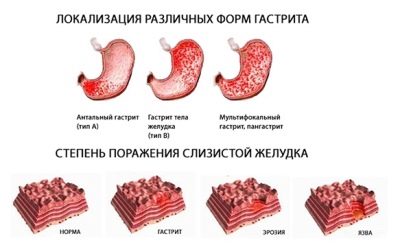Psychosomatics of gastritis in adults and children
Gastritis is not a rare diagnosis in children, but also in adulthood. If earlier, gastritis was mainly diagnosed in adults, who were often nervous and did not have the opportunity to fully eat, but today with such a problem children are also registered with a gastroenterologist. The disease is not always caused solely by the bacteria Helicobacter pylori, sometimes the cause should be sought in the attitudes, thinking and emotional state of a person.
In this article we will talk about the psychosomatic causes of the disease.
General information about the disease
Gastritis is an inflammatory or inflammatory-dystrophic process that occurs in the mucous membrane of the digestive organ. Ailment takes a long time, and the first symptoms often appear after gastritis has been around for a long time.
The more severe the gastritis, the less chance the mucosa has for regeneration, the more likely it is that the stomach will lose some of its functions, in particular, the secretory one.
Gastritis is considered to be officially a precancerous stomach disease, and therefore its diagnosis requires the responsibility of doctors. The risk factors for the onset of the disease usually include a violation of the principles and rules of a healthy diet, a violation of the acidity of gastric juice, not least, stress in the life of a person is given.
Most gastroenterologists tend to put the psychological factor in the first place among all others.
Psychosomatic causes
The psychosomatics of the disease lies in the physiological features of the functions of the stomach. Recall that the stomach is a hollow organ in which food from outside is primarily digested by gastric juice and enzymes, mixed into a homogeneous slurry and transferred into the small intestine, where the absorption of beneficial substances takes place. Food in psychosomatic medicine is considered not only the food that we take for lunch or dinner, but also all the information coming from outside, the perception of people and events.
Psychosomatic disorders begin when a person breaks down the "digestion" of information coming from the outside world. Since gastritis is inflammatory, one of the most important trigger mechanisms is irritation and anger.
The acid, which is the gastric juice, is aggressive in itself, therefore, at the psychosomatic level, it symbolizes aggression. If a person meets information from the outside with aggression, then the likelihood of gastritis increases significantly. Gastritis can occur both against the background of increased acidity of gastric juice, and against a background of low acidity, moreover, the disease often occurs at a completely normal level of acidity.
To establish the exact psychosomatic cause, it is important to find out from the doctor what acidity of juice you have - reduced, normal, or increased.
High acidity
Gastritis with high acidity is usually affected by people who are accustomed to charge themselves with a very big responsibility. They take all external information through the prism of responsibility. At some moments, something may not work, there is not enough strength, then a person begins to blame and blame himself, that is, he directs aggression on himself.
Very often, such a diagnosis is made to representatives of certain professional communities: transport dispatchers, pilots, machinists, drivers of passenger buses. They constantly feel the burden of responsibility for the thousands of lives of others. Such people are quite anxious, although outwardly they can remain calm. They always know how to assess the situation and know exactly how expensive their mistake can cost.
To recover from such gastritis, it is important to begin with a reassessment of your own strength. No need to take extra responsibilities, to charge themselves with what others can and should do. If you leave everything as it is, then the next step will be an ulcer, as well as a cancer of the stomach nearby.
Low acidity
Gastritis with low acidity usually affects infantile people who can make decisions themselves, but prefer that others do it, and even more so others have to make decisions in life and bear the consequences for the consequences. They have no malice in character. No, even useful, which is the driving force and moves people to great achievements. It is easier for them to hope for someone or a higher power, which will “digest” their problems for them.
In this scenario, children often develop gastritis, especially if the children grow up in a family where parents are in no hurry to give the child a responsibility zone, responsibilities, and decide everything for their son or daughter on their own.
For the treatment of such gastritis, it is important to expand the scope of responsibility of the patient, he needs to take responsibility for himself, to learn to complete the work and projects started.
Normal acidity
Gastritis with normal acidity of gastric juice is inherent to people who absorb everything, without disassembling information from the outside world into bad, good, useful and harmful. Typically, such gastritis develops in adolescents who are not too picky in the choice of friends and hobbies, quickly addicted to and quickly cool down to some business.
Another category of patients with normal acidity is people accustomed to success. They invariably seek it, for whatever they take. Even unbearable tasks are quite possible for them (they are said to have their stomachs "digested by nails").
The danger lies in the fact that the stomach, filled with nails, quickly wear mechanically. The same thing happens on the psychosomatic level.
Childhood diseases
Gastritis and gastroduodenitis in children often develops if adults give a child too much information that he simply cannot digest due to his age (and stomach volume) - for example, a kid attends two language courses in his 4 years, a music school and two sections. Tell me, will you master in your 25-30 years old work, study in two universities in the day department and daily reading of half the volume of the Great Soviet Encyclopedia? Even if you master, then you can’t exactly digest the information and assimilate it. What happens to the baby.
In terms of psychosomatics, children often suffer from gastritis, who emotionally cannot “digest” a particular person in their environment. If someone in the kindergarten provokes conflicts all the time, if a teacher or caregiver causes rejection, if there is no warm relationship with his stepfather or stepmother, and this is accompanied by internal stress and irritation, then you should not be surprised at this diagnosis.
It is important to properly and comprehensively approach treatment. The child often needs the help of a qualified child psychologist.
A specialist will help him formulate all the anxieties and dislikes, get rid of them, replace them with more positive feelings and emotions. Such work, coupled with diet and a healthy active lifestyle will surely give its results, then the child will be able to get rid of gastritis as soon as possible.



















